John Lennon
John Lennon
John Lennon was born on 9 October 1940 at Liverpool Maternity Hospital to Julia (née Stanley) (1914–1958) and Alfred Lennon (1912–1976). Alfred was a merchant seaman of Irish descent who was away at the time of his son's birth. His parents named him John Winston Lennon after his paternal grandfather, John "Jack" Lennon, and Prime Minister Winston Churchill. His father was often away from home but sent regular pay cheques to 9 Newcastle Road, Liverpool, where Lennon lived with his mother; the cheques stopped when he went absent without leave in February 1944. When he eventually came home six months later, he offered to look after the family, but Julia, by then pregnant with another man's child, rejected the idea. After her sister Mimi complained to Liverpool's Social Services twice, Julia gave her custody of Lennon.
In July 1946, Lennon's father visited her and took his son to Blackpool, secretly intending to emigrate to New Zealand with him. Julia followed them – with her partner at the time, Bobby Dykins – and after a heated argument, his father forced the five-year-old to choose between them. In one account of this incident, Lennon twice chose his father, but as his mother walked away, he began to cry and followed her. According to author Mark Lewisohn, however, Lennon's parents agreed that Julia should take him and give him a home. Billy Hall, who witnessed the incident, has said that the dramatic portrayal of a young John Lennon being forced to make a decision between his parents is inaccurate. Lennon had no further contact with Alf for close to 20 years.
Throughout the rest of his childhood and adolescence, Lennon lived at Mendips, 251 Menlove Avenue, Woolton, with Mimi and her husband George Toogood Smith, who had no children of their own. His aunt purchased volumes of short stories for him, and his uncle, a dairyman at his family's farm, bought him a mouth organ and engaged him in solving crossword puzzles. Julia visited Mendips on a regular basis, and John often visited her at 1 Blomfield Road, Liverpool, where she played him Elvis Presley records, taught him the banjo, and showed him how to play "Ain't That a Shame" by Fats Domino. In September 1980, Lennon commented about his family and his rebellious nature:
A part of me would like to be accepted by all facets of society and not be this loudmouthed lunatic poet/musician. But I cannot be what I am not ... I was the one who all the other boys' parents – including Paul's father – would say, "Keep away from him" ... The parents instinctively recognised I was a troublemaker, meaning I did not conform and I would influence their children, which I did. I did my best to disrupt every friend's home ... Partly out of envy that I didn't have this so-called home ... but I did ... There were five women that were my family. Five strong, intelligent, beautiful women, five sisters. One happened to be my mother. [She] just couldn't deal with life. She was the youngest and she had a husband who ran away to sea and the war was on and she couldn't cope with me, and I ended up living with her elder sister. Now those women were fantastic ... And that was my first feminist education ... I would infiltrate the other boys' minds. I could say, "Parents are not gods because I don't live with mine and, therefore, I know."
He regularly visited his cousin Stanley Parkes, who lived in Fleetwood and took him on trips to local cinemas. During the school holidays Parkes often visited Lennon with Leila Harvey, another cousin, and the three often travelled to Blackpool two or three times a week to watch shows. They would visit the Blackpool Tower Circus and see artists such as Dickie Valentine, Arthur Askey, Max Bygraves and Joe Loss, with Parkes recalling that Lennon particularly liked George Formby. After Parkes's family moved to Scotland, the three cousins often spent their school holidays together there. Parkes recalled, "John, cousin Leila and I were very close. From Edinburgh we would drive up to the family croft at Durness, which was from about the time John was nine years old until he was about 16." Lennon's uncle George died of a liver haemorrhage on 5 June 1955, aged 52.
Lennon was raised as an Anglican and attended Dovedale Primary School. After passing his eleven-plus exam, he attended Quarry Bank High School in Liverpool from September 1952 to 1957, and was described by Harvey at the time as a "happy-go-lucky, good-humoured, easy going, lively lad". However, he was also known to frequently engage in fights, bully and disrupt classes. Despite this, he quickly built a reputation as the class clown and often drew comical cartoons that appeared in his self-made school magazine, the Daily Howl.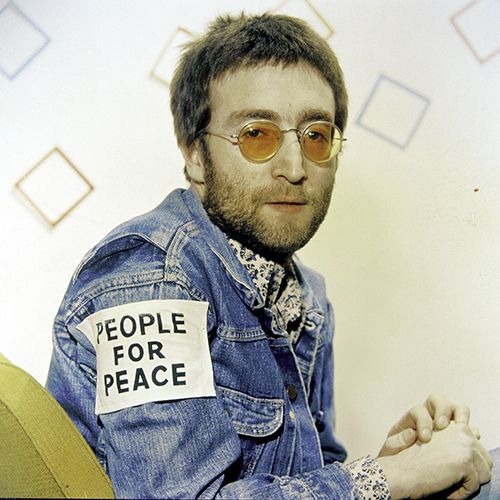
In 1956, Julia bought John his first guitar. The instrument was an inexpensive Gallotone Champion acoustic for which she lent her son five pounds and ten shillings on the condition that the guitar be delivered to her own house and not Mimi's, knowing well that her sister was not supportive of her son's musical aspirations. Mimi was sceptical of his claim that he would be famous one day, and she hoped that he would grow bored with music, often telling him, "The guitar's all very well, John, but you'll never make a living out of it."
Lennon's senior school years were marked by a shift in his behaviour. Teachers at Quarry Bank High School described him thus: "He has too many wrong ambitions and his energy is often misplaced", and "His work always lacks effort. He is content to 'drift' instead of using his abilities." Lennon's misbehaviour created a rift in his relationship with his aunt.
On 15 July 1958, at the age of 44, Julia Lennon was struck and killed by a car while she was walking home after visiting the Smiths' house. His mother's death traumatised the teenage Lennon, who, for the next two years, drank heavily and frequently got into fights, consumed by a "blind rage". Julia's memory would later serve as a major creative inspiration for Lennon, inspiring songs such as the 1968 Beatles song "Julia".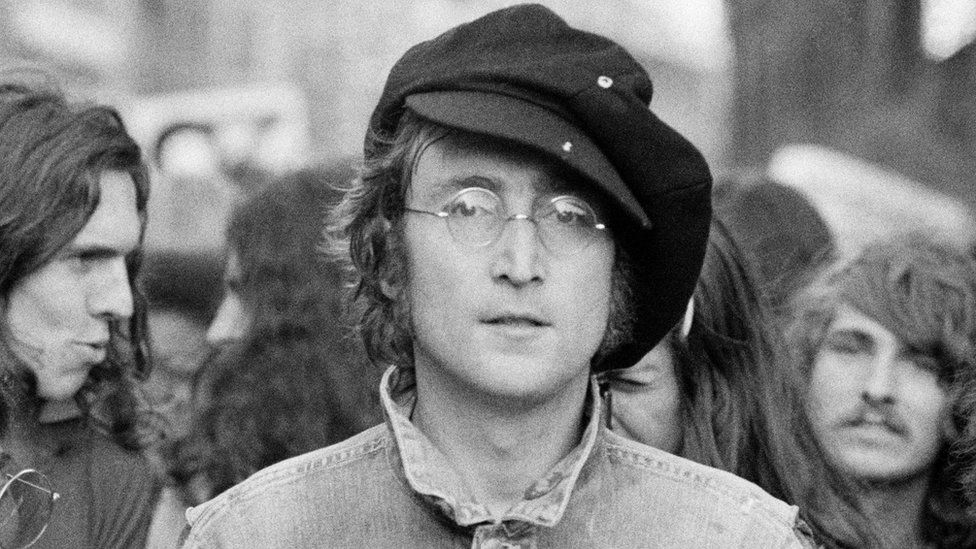
Lennon failed his O-level examinations, and was accepted into the Liverpool College of Art after his aunt and headmaster intervened. At the college he began to wear Teddy Boy clothes and was threatened with expulsion for his behaviour. In the description of Cynthia Powell, Lennon's fellow student and subsequently his wife, he was "thrown out of the college before his final year".
The Quarrymen to the Beatles
At the age of 15, Lennon formed a skiffle group, the Quarrymen. Named after Quarry Bank High School, the group was established by Lennon in September 1956. By the summer of 1957, the Quarrymen played a "spirited set of songs" made up of half skiffle and half rock and roll. Lennon first met Paul McCartney at the Quarrymen's second performance, which was held in Woolton on 6 July at the St Peter's Church garden fête. Lennon then asked McCartney to join the band.
McCartney said that Aunt Mimi "was very aware that John's friends were lower class", and would often patronise him when he arrived to visit Lennon. According to McCartney's brother Mike, their father similarly disapproved of Lennon, declaring that Lennon would get his son "into trouble". McCartney's father nevertheless allowed the fledgling band to rehearse in the family's front room at 20 Forthlin Road. During this time Lennon wrote his first song, "Hello Little Girl", which became a UK top 10 hit for the Fourmost in 1963.
McCartney recommended that his friend George Harrison become the lead guitarist. Lennon thought that Harrison, then 14 years old, was too young. McCartney engineered an audition on the upper deck of a Liverpool bus, where Harrison played "Raunchy" for Lennon and was asked to join. Stuart Sutcliffe, Lennon's friend from art school, later joined as bassist. Lennon, McCartney, Harrison and Sutcliffe became "The Beatles" in early 1960. In August that year, the Beatles were engaged for a 48-night residency in Hamburg, in West Germany, and were desperately in need of a drummer. They asked Pete Best to join them. Lennon's aunt, horrified when he told her about the trip, pleaded with Lennon to continue his art studies instead. After the first Hamburg residency, the band accepted another in April 1961, and a third in April 1962. As with the other band members, Lennon was introduced to Preludin while in Hamburg, and regularly took the drug as a stimulant during their long, overnight performances.
Brian Epstein managed the Beatles from 1962 until his death in 1967. He had no previous experience managing artists, but he had a strong influence on the group's dress code and attitude on stage. Lennon initially resisted his attempts to encourage the band to present a professional appearance, but eventually complied, saying "I'll wear a bloody balloon if somebody's going to pay me." McCartney took over on bass after Sutcliffe decided to stay in Hamburg, and Best was replaced with drummer Ringo Starr; this completed the four-piece line-up that would remain until the group's break-up in 1970. The band's first single, "Love Me Do", was released in October 1962 and reached No. 17 on the British charts. They recorded their debut album, Please Please Me, in under 10 hours on 11 February 1963, a day when Lennon was suffering the effects of a cold, which is evident in the vocal on the last song to be recorded that day, "Twist and Shout". The Lennon–McCartney songwriting partnership yielded eight of its fourteen tracks. With a few exceptions, one being the album title itself, Lennon had yet to bring his love of wordplay to bear on his song lyrics, saying: "We were just writing songs ... pop songs with no more thought of them than that – to create a sound. And the words were almost irrelevant". In a 1987 interview, McCartney said that the other Beatles idolised Lennon: "He was like our own little Elvis ... We all looked up to John. He was older and he was very much the leader; he was the quickest wit and the smartest."
The Beatles achieved mainstream success in the UK early in 1963. Lennon was on tour when his first son, Julian, was born in April. During their Royal Variety Show performance, which was attended by the Queen Mother and other British royalty, Lennon poked fun at the audience: "For our next song, I'd like to ask for your help. For the people in the cheaper seats, clap your hands ... and the rest of you, if you'll just rattle your jewellery." After a year of Beatlemania in the UK, the group's historic February 1964 US debut appearance on The Ed Sullivan Show marked their breakthrough to international stardom. A two-year period of constant touring, filmmaking, and songwriting followed, during which Lennon wrote two books, In His Own Write and A Spaniard in the Works. The Beatles received recognition from the British establishment when they were appointed Members of the Order of the British Empire (MBE) in the 1965 Queen's Birthday Honours.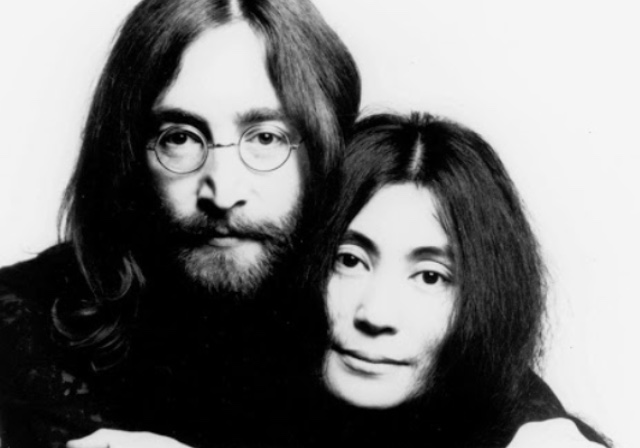
Lennon grew concerned that fans who attended Beatles concerts were unable to hear the music above the screaming of fans, and that the band's musicianship was beginning to suffer as a result. Lennon's "Help!" expressed his own feelings in 1965: "I meant it ... It was me singing 'help'". He had put on weight (he would later refer to this as his "Fat Elvis" period), and felt he was subconsciously seeking change. In March that year he and Harrison were unknowingly introduced to LSD when a dentist, hosting a dinner party attended by the two musicians and their wives, spiked the guests' coffee with the drug. When they wanted to leave, their host revealed what they had taken, and strongly advised them not to leave the house because of the likely effects. Later, in a lift at a nightclub, they all believed it was on fire; Lennon recalled: "We were all screaming ... hot and hysterical." In March 1966, during an interview with Evening Standard reporter Maureen Cleave, Lennon remarked, "Christianity will go. It will vanish and shrink ... We're more popular than Jesus now – I don't know which will go first, rock and roll or Christianity." The comment went virtually unnoticed in England but caused great offence in the US when quoted by a magazine there five months later. The furore that followed, which included the burning of Beatles records, Ku Klux Klan activity and threats against Lennon, contributed to the band's decision to stop touring.
In late June, the Beatles performed Lennon's "All You Need Is Love" as Britain's contribution to the Our World satellite broadcast, before an international audience estimated at up to 400 million. Intentionally simplistic in its message, the song formalised his pacifist stance and provided an anthem for the Summer of Love. After the Beatles were introduced to the Maharishi Mahesh Yogi, the group attended an August weekend of personal instruction at his Transcendental Meditation seminar in Bangor, Wales. During the seminar, they were informed of Epstein's death. "I knew we were in trouble then", Lennon said later. "I didn't have any misconceptions about our ability to do anything other than play music. I was scared – I thought, 'We've fucking had it now.'" McCartney organised the group's first post-Epstein project, the self-written, -produced and -directed television film Magical Mystery Tour, which was released in December that year. While the film itself proved to be their first critical flop, its soundtrack release, featuring Lennon's Lewis Carroll-inspired "I Am the Walrus", was a success.
Led by Harrison and Lennon's interest, the Beatles travelled to the Maharishi's ashram in India in February 1968 for further guidance. While there, they composed most of the songs for their double album The Beatles, but the band members' mixed experience with Transcendental Meditation signalled a sharp divergence in the group's camaraderie. On their return to London, they became increasingly involved in business activities with the formation of Apple Corps, a multimedia corporation composed of Apple Records and several other subsidiary companies. Lennon described the venture as an attempt to achieve "artistic freedom within a business structure". Released amid the Protests of 1968, the band's debut single for the Apple label included Lennon's B-side "Revolution", in which he called for a "plan" rather than committing to Maoist revolution. The song's pacifist message led to ridicule from political radicals in the New Left press. Adding to the tensions at the Beatles' recording sessions that year, Lennon insisted on having his new girlfriend, the Japanese artist Yoko Ono, beside him, thereby contravening the band's policy regarding wives and girlfriends in the studio. He was especially pleased with his songwriting contributions to the double album and identified it as a superior work to Sgt. Pepper. At the end of 1968, Lennon participated in The Rolling Stones Rock and Roll Circus, a television special that was not broadcast. Lennon performed with the Dirty Mac, a supergroup composed of Lennon, Eric Clapton, Keith Richards and Mitch Mitchell. The group also backed a vocal performance by Ono. A film version was released in 1996.
By late 1968, Lennon's increased drug use and growing preoccupation with Ono, combined with the Beatles' inability to agree on how the company should be run, left Apple in need of professional management. Lennon asked Lord Beeching to take on the role but he declined, advising Lennon to go back to making records. Lennon was approached by Allen Klein, who had managed the Rolling Stones and other bands during the British Invasion. In early 1969, Klein was appointed as Apple's chief executive by Lennon, Harrison and Starr but McCartney never signed the management contract.
Lennon and Ono were married on 20 March 1969 and soon released a series of 14 lithographs called "Bag One" depicting scenes from their honeymoon, eight of which were deemed indecent and most of which were banned and confiscated. Lennon's creative focus continued to move beyond the Beatles, and between 1968 and 1969 he and Ono recorded three albums of experimental music together: Unfinished Music No. 1: Two Virgins (known more for its cover than for its music), Unfinished Music No. 2: Life with the Lions and Wedding Album. In 1969, they formed the Plastic Ono Band, releasing Live Peace in Toronto 1969. Between 1969 and 1970, Lennon released the singles "Give Peace a Chance", which was widely adopted as an anti-Vietnam War anthem, "Cold Turkey", which documented his withdrawal symptoms after he became addicted to heroin, and "Instant Karma!".
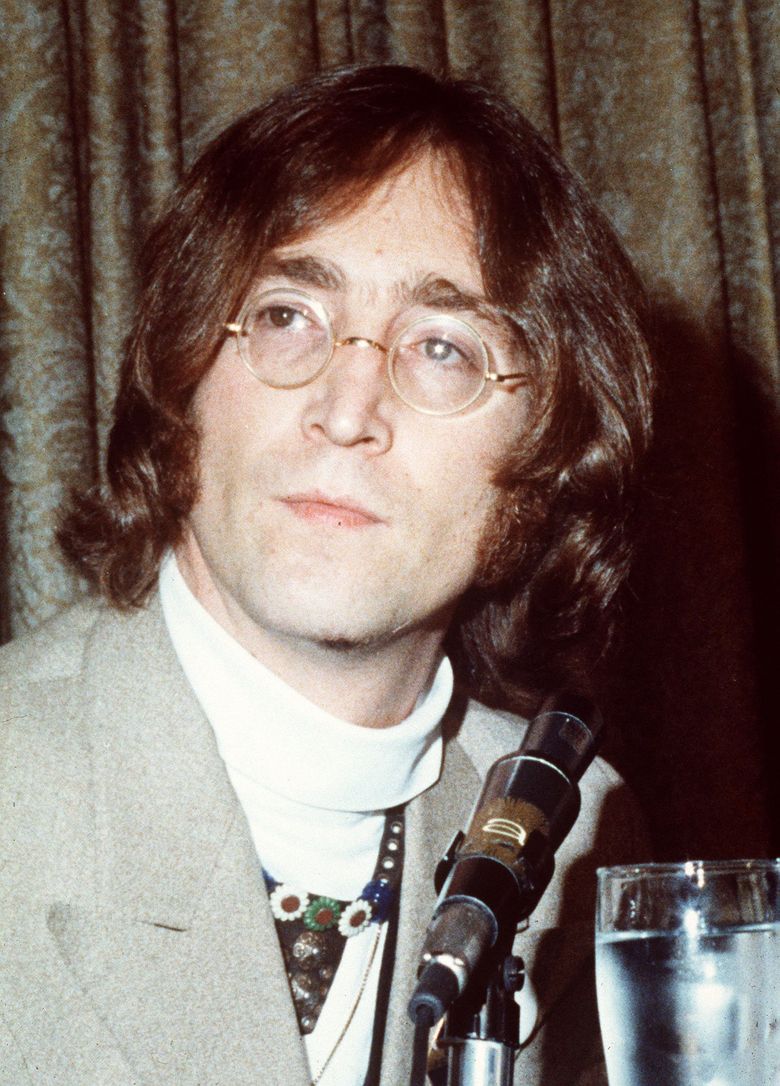
In protest at Britain's involvement in "the Nigeria-Biafra thing" (namely, the Nigerian Civil War), its support of America in the Vietnam War and (perhaps jokingly) against "Cold Turkey" slipping down the charts, Lennon returned his MBE medal to the Queen. This gesture had no effect on his MBE status, which could be renounced but ultimately only the Sovereign has the power to annul the original award. The medal, together with Lennon's letter, is held at the Central Chancery of the Orders of Knighthood.
Lennon left the Beatles on 20 September 1969, but agreed not to inform the media while the group renegotiated their recording contract. He was outraged that McCartney publicised his own departure on releasing his debut solo album in April 1970. Lennon's reaction was, "Jesus Christ! He gets all the credit for it!" He later wrote, "I started the band. I disbanded it. It's as simple as that." In a December 1970 interview with Jann Wenner of Rolling Stone magazine, he revealed his bitterness towards McCartney, saying, "I was a fool not to do what Paul did, which was use it to sell a record." Lennon also spoke of the hostility he perceived the other members had towards Ono, and of how he, Harrison and Starr "got fed up with being sidemen for Paul ... After Brian Epstein died we collapsed. Paul took over and supposedly led us. But what is leading us when we went round in circles?"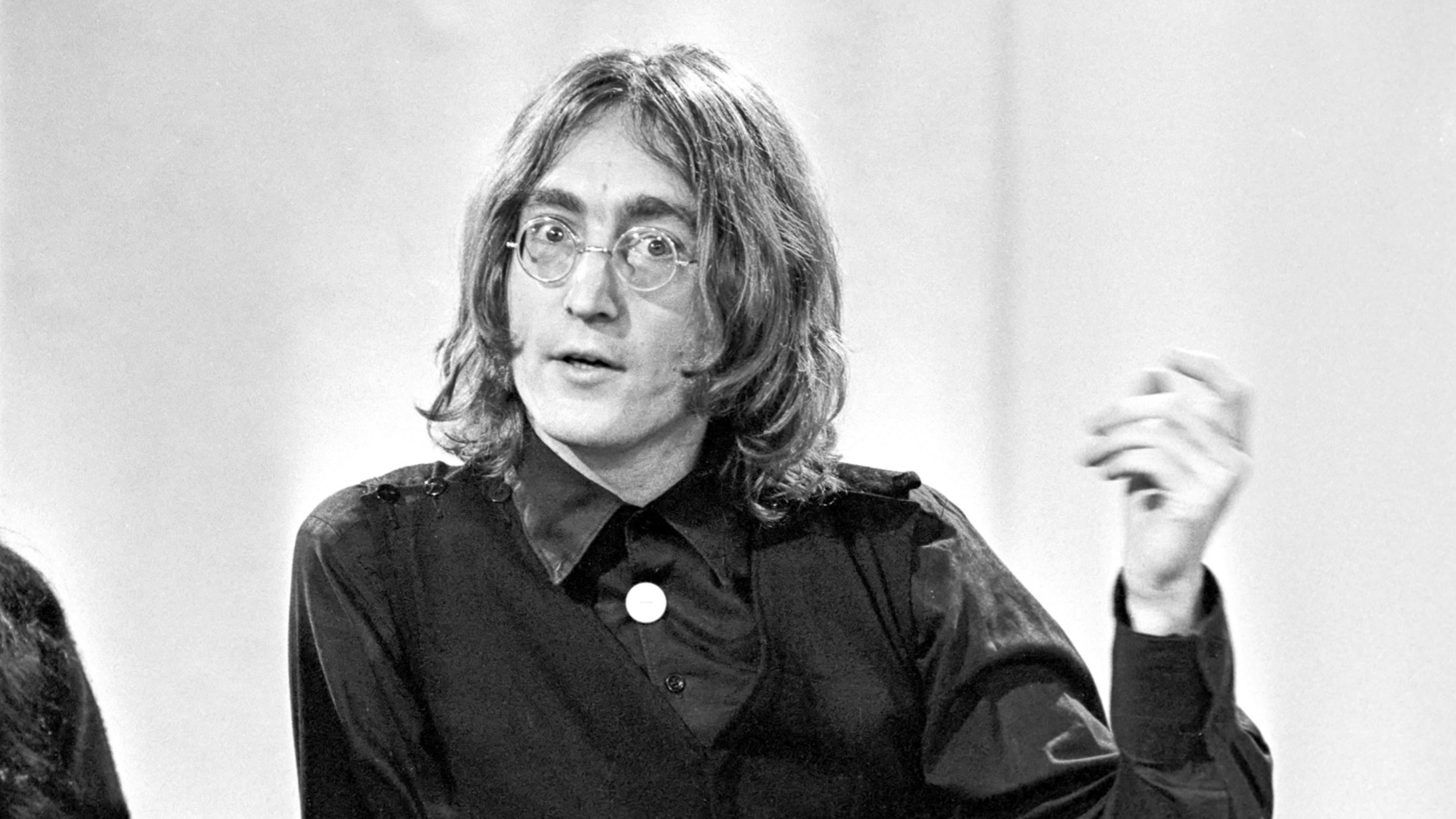
Between 1 April and 15 September 1970, Lennon and Ono went through primal therapy with Arthur Janov at Tittenhurst, in London and at Janov's clinic in Los Angeles, California. Designed to release emotional pain from early childhood, the therapy entailed two half-days a week with Janov for six months; he had wanted to treat the couple for longer, but their American visa ran out and they had to return to the UK. Lennon's debut solo album, John Lennon/Plastic Ono Band (1970), was received with praise by many music critics, but its highly personal lyrics and stark sound limited its commercial performance. The album featured the song "Mother", in which Lennon confronted his feelings of childhood rejection, and the Dylanesque "Working Class Hero", a bitter attack against the bourgeois social system which, due to the lyric "you're still fucking peasants", fell foul of broadcasters.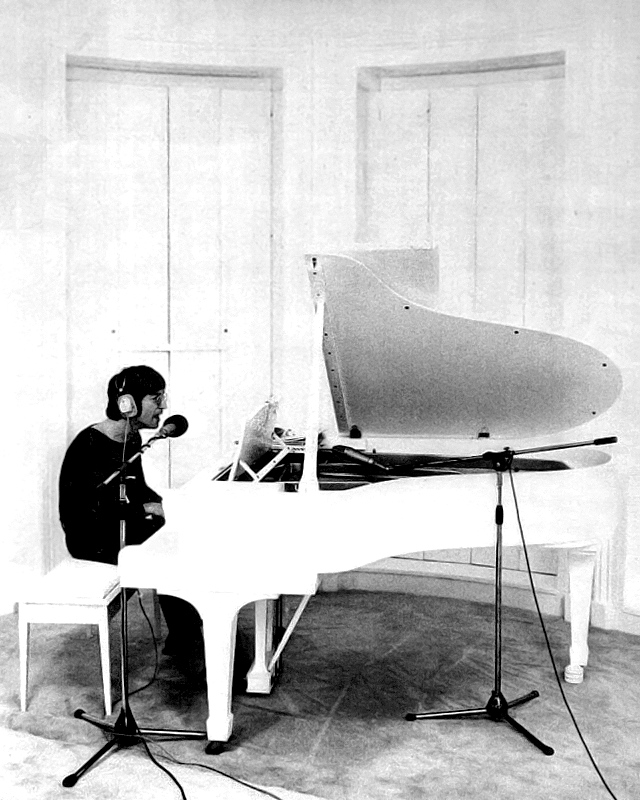
In January 1971, Tariq Ali expressed his revolutionary political views when he interviewed Lennon, who immediately responded by writing "Power to the People". In his lyrics to the song, Lennon reversed the non-confrontational approach he had espoused in "Revolution", although he later disowned "Power to the People", saying that it was borne out of guilt and a desire for approval from radicals such as Ali. Lennon became involved in a protest against the prosecution of Oz magazine for alleged obscenity. Lennon denounced the proceedings as "disgusting fascism", and he and Ono (as Elastic Oz Band) released the single "God Save Us/Do the Oz" and joined marches in support of the magazine.

Eager for a major commercial success, Lennon adopted a more accessible sound for his next album, Imagine (1971). Rolling Stone reported that "it contains a substantial portion of good music" but warned of the possibility that "his posturings will soon seem not merely dull but irrelevant". The album's title track later became an anthem for anti-war movements, while the song "How Do You Sleep?" was a musical attack on McCartney in response to lyrics on Ram that Lennon felt, and McCartney later confirmed, were directed at him and Ono. In "Jealous Guy", Lennon addressed his demeaning treatment of women, acknowledging that his past behaviour was the result of long-held insecurity.
In gratitude for his guitar contributions to Imagine, Lennon initially agreed to perform at Harrison's Concert for Bangladesh benefit shows in New York. Harrison refused to allow Ono to participate at the concerts, however, which resulted in the couple having a heated argument and Lennon pulling out of the event.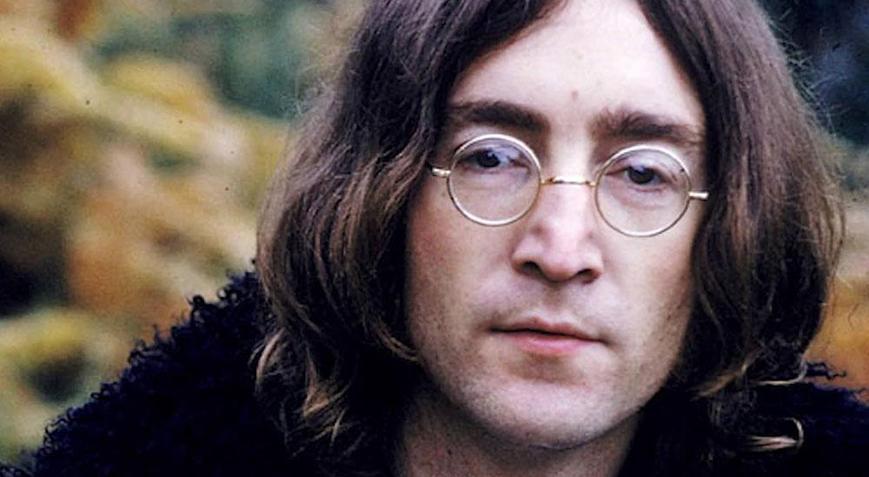
Lennon and Ono moved to New York in August 1971 and immediately embraced US radical left politics. The couple released their "Happy Xmas (War Is Over)" single in December. During the new year, the Nixon administration took what it called a "strategic counter-measure" against Lennon's anti-war and anti-Nixon propaganda. The administration embarked on what would be a four-year attempt to deport him. Lennon was embroiled in a continuing legal battle with the immigration authorities, and he was denied permanent residency in the US; the issue would not be resolved until 1976.
Some Time in New York City was recorded as a collaboration with Ono and was released in 1972 with backing from the New York band Elephant's Memory. A double LP, it contained songs about women's rights, race relations, Britain's role in Northern Ireland and Lennon's difficulties in obtaining a green card. The album was a commercial failure and was maligned by critics, who found its political sloganeering heavy-handed and relentless. The NME's review took the form of an open letter in which Tony Tyler derided Lennon as a "pathetic, ageing revolutionary". In the US, "Woman Is the Nigger of the World" was released as a single from the album and was televised on 11 May, on The Dick Cavett Show. Many radio stations refused to broadcast the song because of the word "nigger".
Lennon and Ono gave two benefit concerts with Elephant's Memory and guests in New York in aid of patients at the Willowbrook State School mental facility. Staged at Madison Square Garden on 30 August 1972, they were his last full-length concert appearances. After George McGovern lost the 1972 presidential election to Richard Nixon, Lennon and Ono attended a post-election wake held in the New York home of activist Jerry Rubin. Lennon was depressed and got intoxicated; he left Ono embarrassed after he had sex with a female guest. Ono's song "Death of Samantha" was inspired by the incident.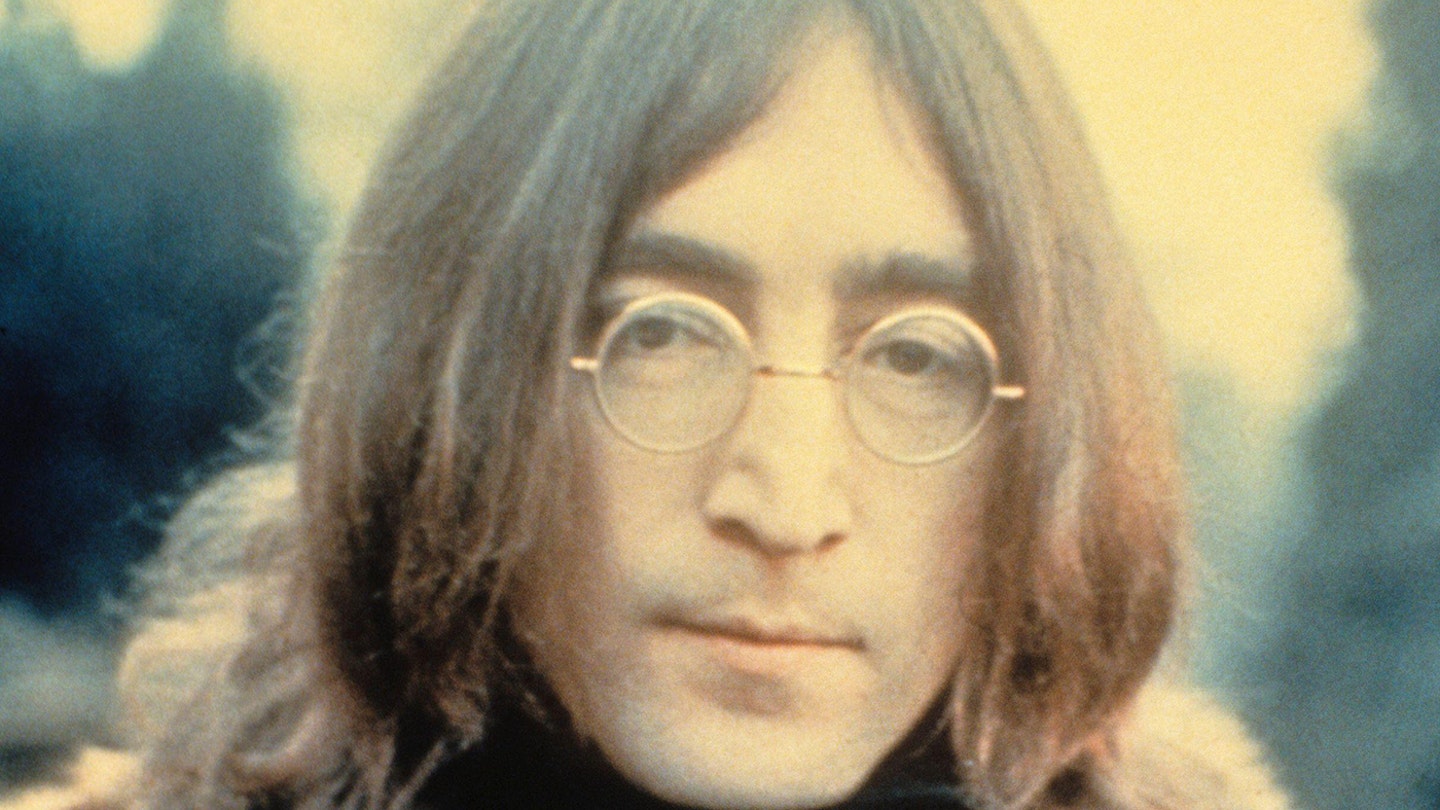
References
- Coleman 1984b, p. 64.
- ^ Newman, Jason (23 August 2011). "It Takes Two: 10 Songwriting Duos That Rocked Music History". Billboard. Archived from the original on 23 June 2018. Retrieved 5 October 2017. By any measure, no one comes close to matching the success of The Beatles' primary songwriters.^ Jump up to
- a b "24th Annual GRAMMY Awards | GRAMMY.com". www.grammy.com.
- ^ Harry 2000b, p. 504.
- ^ Spitz 2005, p. 24: "Julia offered the name in honour of ... Winston Churchill".
- ^ Spitz 2005, p. 24: "The entire Stanley clan gathered nightly at Newcastle Road".
- ^ Lennon 2005, p. 54: "Until then he had sent her money each month from his wages, but now it stopped".
- ^ Spitz 2005, p. 26: "In February 1944 ... he was arrested and imprisoned. Freddie subsequently disappeared for six months".











































